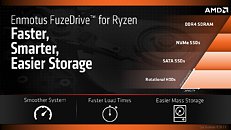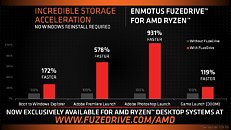Raevenlord
News Editor
- Joined
- Aug 12, 2016
- Messages
- 3,755 (1.20/day)
- Location
- Portugal
| System Name | The Ryzening |
|---|---|
| Processor | AMD Ryzen 9 5900X |
| Motherboard | MSI X570 MAG TOMAHAWK |
| Cooling | Lian Li Galahad 360mm AIO |
| Memory | 32 GB G.Skill Trident Z F4-3733 (4x 8 GB) |
| Video Card(s) | Gigabyte RTX 3070 Ti |
| Storage | Boot: Transcend MTE220S 2TB, Kintson A2000 1TB, Seagate Firewolf Pro 14 TB |
| Display(s) | Acer Nitro VG270UP (1440p 144 Hz IPS) |
| Case | Lian Li O11DX Dynamic White |
| Audio Device(s) | iFi Audio Zen DAC |
| Power Supply | Seasonic Focus+ 750 W |
| Mouse | Cooler Master Masterkeys Lite L |
| Keyboard | Cooler Master Masterkeys Lite L |
| Software | Windows 10 x64 |
AMD today in a blog post announced the fruits of its partnership with Enmotus, a mainly enterprise-focused company that has made its name in creating performance-optimizing software solutions. The new solution, the FuzeDrive, is an ingenius (paid) software stack that will aggregate all of a users' system memory (be it RAM, HDDs, SSDs, NVMe drives, all of that) and expose it as a single drive via software. The goal is to allow the software to optimize data placement on the fly according to its read/write needs, creating caching solutions at will, learning from users' usage patterns, and basically creating a "set it and forget it" experience for users that critically also improves performance (and by AMD's estimates, it really does do so by a significant margin).
All of these features were pretty hard-set from the start; in the AMD blog post by Don Woligroski, he states that "AMD started with a list of goals, like improving storage performance and lowering loading times." AMD's love for open standards still hasn't gone and went away; he said that "because AMD believes in open hardware standards, it prefers to work with off-the-shelf, non-proprietary NVMe, SSD, and hard disk drives." Convenience was also a very important item to check; according to AMD, "any superior storage acceleration solution needs to be easy to set up, and simple to use." And the company believes they've achieved all of that with their new solution.

AMD worked together to tailor Enmotus' FuzeDrive software for use with AMD Ryzen desktop processors in the consumer desktop PC space, for systems using the AMD B350 and X370 chipsets (Socket AM4 Ryzen 7, 5, and 3) and the X399 chipset (socket sTR4 Ryzen Threadripper), but has left users with motherboards packing AMD's A320 chipset out in the cold (at least, for the time being).
FuzeDrive is always aware of changes to your memory subsystem after it's been integrated with your Ryzen PC; AMD has laid out a few usage scenarios and their corresponding sequence of events:
Performance option 1
You installed Windows on a relatively slow mechanical hard drive. With FuzeDrive, if you add an SSD or NVMe drive later, you will enjoy the speed of an SSD when you boot your PC, or load programs and data that you most often employ.
Performance Option 2
You installed windows on a fast SSD drive, but are running out of capacity. If you add a large mechanical hard disk, FuzeDrive will recognize that the programs you use most should stay resident on the speedy SSD, and move the data that is rarely accessed to the mechanical hard disk. This gives you the best of both worlds: high performance with large capacity.
Performance Option 3
For the fastest booting and storage, a large conventional SSD paired with bootable 3D Xpoint NVMe drive for incredible booting speed, application launch, and data access performance.
AMD has also made some lofty performance claims when it comes to the new Enmotus FuzeDrive software solution; the company is claiming performance improvements that can go up to 931% (in the case of Adobe Premiere startup), some interesting 147% improvement in Windows Explorer boot times, and a saner 119% performance improvement in games startup (DOOM).

Now of course, whether or not this will always improve performance is anyone's guess; it's doubtful it will do so, however, simply because of the software nature of the solution. One also has to take into account the likelihood of increased data loss probability when using a caching scheme such as this. And as always, the devil is in the details, so I'll just leave the AMD blog posts' footnotes right after this sentence:
"Testing by AMD Performance labs as of 12/21/2017 on the following system. PC manufacturers may vary configurations yielding different results. Results may vary based on driver versions used. System Configs: AMD Ryzen 5 1600X, GA-AX370 AORUS Gaming 5 motherboard, 16GB of dual-channel DDR3-3200, Graphics driver 23.20.768.0 (17.40), and a Seagate Barracuda 500GB boot drive. When Enmotus FuzeDrive was enabled, a Samsung 950 PRO NVMe drive was added to the drive pool. Without Enmotus FuzeDrive for Ryzen, the system took 28.611 seconds to complete a boot to windows via explorer; 21.421 seconds to initialize SMSS; 2.274 seconds to initialize the Windows Logon; 56.04 seconds to launch adobe premiere; 59.27 seconds to launch adobe photoshop; and 85.09 seconds to launch DOOM. With Enmotus FuzeDrive for Ryzen enabled, the system took 10.534 seconds to complete a boot to windows via explorer (28.611/10.534=272%, or 172% faster); 3.926 seconds to initialize SMSS (21.421/3.926=546%, or 446% faster); 1.461 seconds to initialize the Windows Logon (2.274/1.461=156%, or 56% faster); 8.27 seconds to launch adobe premiere (56.04/8.27=678%, or 578% faster); 5.75 seconds to launch adobe photoshop (59.27/5.75=1031%, or 931% faster); and 38.77 seconds to launch DOOM (59.27/38.77=219%, or 119% faster)."
TL; DR: Essentially, the performance increase doesn't come from activating the FuzeDrive software on the Ryzen system; but from both activating it and adding a Samsung 950 Pro SSD to the system. How much of the performance improvement can be attributed to the added NVMe drive alone is a valid question, and we'd wager it's most of it. You can purchase a license to Enmotus' FuzeDrive for your AMD system for $19.99.
View at TechPowerUp Main Site
All of these features were pretty hard-set from the start; in the AMD blog post by Don Woligroski, he states that "AMD started with a list of goals, like improving storage performance and lowering loading times." AMD's love for open standards still hasn't gone and went away; he said that "because AMD believes in open hardware standards, it prefers to work with off-the-shelf, non-proprietary NVMe, SSD, and hard disk drives." Convenience was also a very important item to check; according to AMD, "any superior storage acceleration solution needs to be easy to set up, and simple to use." And the company believes they've achieved all of that with their new solution.

AMD worked together to tailor Enmotus' FuzeDrive software for use with AMD Ryzen desktop processors in the consumer desktop PC space, for systems using the AMD B350 and X370 chipsets (Socket AM4 Ryzen 7, 5, and 3) and the X399 chipset (socket sTR4 Ryzen Threadripper), but has left users with motherboards packing AMD's A320 chipset out in the cold (at least, for the time being).
FuzeDrive is always aware of changes to your memory subsystem after it's been integrated with your Ryzen PC; AMD has laid out a few usage scenarios and their corresponding sequence of events:
Performance option 1
You installed Windows on a relatively slow mechanical hard drive. With FuzeDrive, if you add an SSD or NVMe drive later, you will enjoy the speed of an SSD when you boot your PC, or load programs and data that you most often employ.
Performance Option 2
You installed windows on a fast SSD drive, but are running out of capacity. If you add a large mechanical hard disk, FuzeDrive will recognize that the programs you use most should stay resident on the speedy SSD, and move the data that is rarely accessed to the mechanical hard disk. This gives you the best of both worlds: high performance with large capacity.
Performance Option 3
For the fastest booting and storage, a large conventional SSD paired with bootable 3D Xpoint NVMe drive for incredible booting speed, application launch, and data access performance.
AMD has also made some lofty performance claims when it comes to the new Enmotus FuzeDrive software solution; the company is claiming performance improvements that can go up to 931% (in the case of Adobe Premiere startup), some interesting 147% improvement in Windows Explorer boot times, and a saner 119% performance improvement in games startup (DOOM).

Now of course, whether or not this will always improve performance is anyone's guess; it's doubtful it will do so, however, simply because of the software nature of the solution. One also has to take into account the likelihood of increased data loss probability when using a caching scheme such as this. And as always, the devil is in the details, so I'll just leave the AMD blog posts' footnotes right after this sentence:
"Testing by AMD Performance labs as of 12/21/2017 on the following system. PC manufacturers may vary configurations yielding different results. Results may vary based on driver versions used. System Configs: AMD Ryzen 5 1600X, GA-AX370 AORUS Gaming 5 motherboard, 16GB of dual-channel DDR3-3200, Graphics driver 23.20.768.0 (17.40), and a Seagate Barracuda 500GB boot drive. When Enmotus FuzeDrive was enabled, a Samsung 950 PRO NVMe drive was added to the drive pool. Without Enmotus FuzeDrive for Ryzen, the system took 28.611 seconds to complete a boot to windows via explorer; 21.421 seconds to initialize SMSS; 2.274 seconds to initialize the Windows Logon; 56.04 seconds to launch adobe premiere; 59.27 seconds to launch adobe photoshop; and 85.09 seconds to launch DOOM. With Enmotus FuzeDrive for Ryzen enabled, the system took 10.534 seconds to complete a boot to windows via explorer (28.611/10.534=272%, or 172% faster); 3.926 seconds to initialize SMSS (21.421/3.926=546%, or 446% faster); 1.461 seconds to initialize the Windows Logon (2.274/1.461=156%, or 56% faster); 8.27 seconds to launch adobe premiere (56.04/8.27=678%, or 578% faster); 5.75 seconds to launch adobe photoshop (59.27/5.75=1031%, or 931% faster); and 38.77 seconds to launch DOOM (59.27/38.77=219%, or 119% faster)."
TL; DR: Essentially, the performance increase doesn't come from activating the FuzeDrive software on the Ryzen system; but from both activating it and adding a Samsung 950 Pro SSD to the system. How much of the performance improvement can be attributed to the added NVMe drive alone is a valid question, and we'd wager it's most of it. You can purchase a license to Enmotus' FuzeDrive for your AMD system for $19.99.
View at TechPowerUp Main Site






